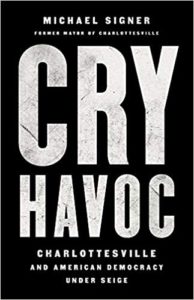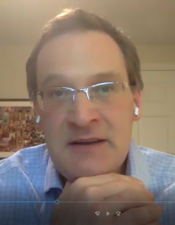Cry Havoc: Charlottesville and American Democracy Under Siege
Saturday, May 16th, 2020 The deadly invasion of Charlottesville, Virginia, by white nationalist militias in August 2017 is a microcosm of the challenges facing American democracy. No one is better placed to tell the story of what really happened, and to draw out its larger significance, than Michael Signer, then Charlottesville’s mayor. His new book, Cry Havoc: Charlottesville and American Democracy Under Siege, is a vivid, first-person chronicle of the terror and mayhem of the August 2017 Unite the Right event that reveals how issues of extremism are affecting not just one city but the nation itself.
The deadly invasion of Charlottesville, Virginia, by white nationalist militias in August 2017 is a microcosm of the challenges facing American democracy. No one is better placed to tell the story of what really happened, and to draw out its larger significance, than Michael Signer, then Charlottesville’s mayor. His new book, Cry Havoc: Charlottesville and American Democracy Under Siege, is a vivid, first-person chronicle of the terror and mayhem of the August 2017 Unite the Right event that reveals how issues of extremism are affecting not just one city but the nation itself.
Mr. Signer sets the events on the ground, the lead-up to August’s “Unite the Right” rally, the days of the weekend itself, the aftermath-into the larger context of a country struggling to find its way through the Trump era.
Mike confronts some of the most pressing questions of our moment. How do we:
- Reconcile free speech with the need for public order?
- Maintain the values of pragmatism, compromise, even simple civility, in a time of intensification of extremes on the right and the left?
- Address systemic racism through our public spaces and memorials?
- Do something about the widespread disaffection with institutions and a democracy that seems to be faltering and turning on itself?
The siege of Charlottesville shows how easily our communities can be taken hostage by forces intent on destroying democratic norms and institutions. But Mike concludes with a stirring call for optimism, pointing out, with evidence drawn from Charlottesville and work it has spurred since, that even this tragedy contains an opportunity to bolster democracy from within and defend our very ability to govern.
The podcast of the event is below. This Zoom program was hosted by Rich DeMong, SSV board member and past president. It was moderated by board member Peyton Williams.
 Mike Signer served as the mayor of Charlottesville, Virginia, from 2016-2018 during the Unite the Right rally of 2017. The Washington Post wrote that he was “one of Trump’s strongest critics.” Afterward, he founded and chaired Communities Overcoming Extremism: the After Charlottesville Project, a bipartisan coalition including the Anti-Defamation League, the Ford Foundation, the Charles Koch Institute, the Fetzer Institute, and New America. National Public Radio featured Mike’s work “sharing painful lessons from the fight against hate.”
Mike Signer served as the mayor of Charlottesville, Virginia, from 2016-2018 during the Unite the Right rally of 2017. The Washington Post wrote that he was “one of Trump’s strongest critics.” Afterward, he founded and chaired Communities Overcoming Extremism: the After Charlottesville Project, a bipartisan coalition including the Anti-Defamation League, the Ford Foundation, the Charles Koch Institute, the Fetzer Institute, and New America. National Public Radio featured Mike’s work “sharing painful lessons from the fight against hate.”
Mike is VP and general counsel of the country’s largest independent digital design agency, where he sits on the firm’s executive committee. He has also taught for the University of Virginia and Virginia Tech. He is the author of three books: Cry Havoc: Charlottesville and American Democracy under Siege (PublicAffairs, 2020), Becoming Madison: The Extraordinary Origins of the Least Likely Founding Father (PublicAffairs, 2015), and Demagogue: the Fight to Save Democracy from Its Worst Enemies (Palgrave Macmillan, 2009). He has written for the New York Times, The Washington Post, The Atlantic, and Time, and has been interviewed on Meet the Press, Face the Nation, The Rachel Maddow Show, AC360, and NPR.
He is a recipient of the Levenson Family Defender of Democracy Award from the Anti-Defamation League, the Courage in Political Leadership Award from the American Society for Yad Vashem, and the Rob DeBree & David O’Malley Award for Community Response to Hatred from the Matthew Shepard Foundation. Forward Magazine has named him one of 50 most influential Jewish leaders in America. He is an Aspen Institute Rodel Fellow. He has been profiled by the New York Times, Washington Post, NPR, CNN, and the Guardian.
He lives with his wife and their twin five year old boys in Charlottesville. In his spare time, he enjoys running, reading, cooking, gardening, and being a jungle gym for his boys.
Program Summary
Former mayor of Charlottesville spoke on the selection of Cry Havoc as the title chosen for the book. “Havoc” was originally a battle cry and he now feels “cry havoc” is a challenge to understand American Democracy, its democratic resilience and its ability to resolve problems. The title reflects not only the August 12 demonstrations in Charlottesville, but also that Charlottesville parallels what is happening all over America.
Speaking specifically of the problems in Charlottesville, Signer spoke of three major and two minor “brushfires” that led to the demonstrations. 1. The conflict of freedom of speech and public safety. 2. The history of race relations in the community and the statue debate. 3. Accountability leading to tension between government and citizens. 4. Civility and 5. Equity. Democracy is messy and there are lots of gray areas that don’t have simple clear answers to the proper way forward.
Signer then spent time talking about the structure of a city manager form of government and how it influenced the responses on August 12. He made it clear that the role of city council is to advise the city manager whose job it is to make the decisions during an emergency. Mr. Signer is not a proponent of this type of governing and would prefer that the mayor and council have more of a decision-making role and the city manager would become an elected position. He admits the latter was not popular with his colleagues. Mr. Signer spent time to review the actual contacts between city leaders and UVA on August 11 and 12 and the work to try to rescind the August 12 permit.
As a result of a Virginia paramilitary law and August 12 studies that assessed what could have been done to prevent the riots, ideas were implemented on the one-year anniversary and no militia groups returned to Charlottesville.
